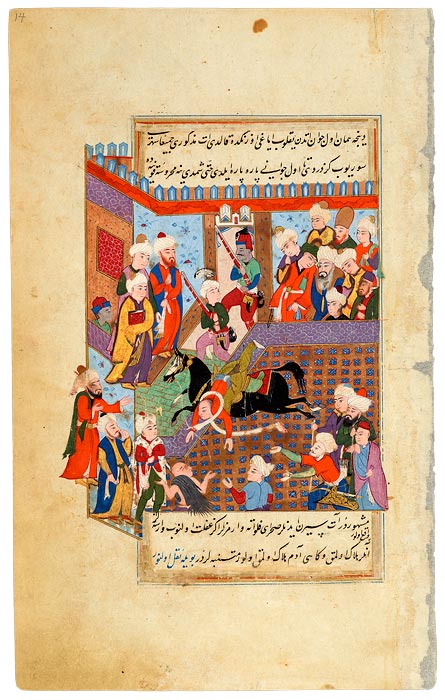
While meditating near his father's tomb, Rūmī is disturbed when the sultan's courtier, Valad-i Fakhr al-Dīn Shādid, in princely attire, rides his black horse through the cemetery. Rūmī strongly reproves the rider, who then loses control of his horse, falls to the ground, and is injured. Rūmī, with a gray beard, is at the upper right, surrounded by students. Two men with guns guard the entrance to the walled city in the background. The cemetery itself is located outside the city walls, as was the custom.
This miniature is part of a sixteenth-century manuscript account of the life and miracles of the Persian poet and mystic known as Rūmī. It is a Turkish translation of an abridged version of the original fourteenth-century Persian account by the dervish known as Aflākī.
Rūmī, Persian Mystic And Poet
The sixteenth-century miniatures presented here concern the life and miracles of Jalāl al-Dīn Rūmī, called Mē vlāna (Our Master), the most famous member of the Mevlevī order and Persia's greatest Sufi mystic and poet. He was born in Balkh in 1207, but his family emigrated after his father foresaw the Mongol conquest. They eventually resettled in Konya, Turkey, then the capital of Anatolian Rūm (thus Rūmī), where the poet died on 17 December 1273.
Several Persian accounts of Rūmī's life have been written, the first by his son, Sultan Walad. The third, laden with moralizing miracle stories, was ordered by Rūmī's grandson Ulu ˓Ārif Chelebi. It was written by the dervish Shams al-Dīn Aḥmad, called Aflākī (d. 1360). Aflākī also incorporated verses from Rūmī's works, notably his six-volume Masnavī (a poetical form of rhyming couplets) and the Dīvān-i-Shams al-Dīn Tabrīzī, named after Shams of Tabriz, the mystic who changed Rūmī's life and transformed him into a poet when they met in 1244.
In 1590—three and a half centuries after Aflākī wrote his life of Rūmī—the Ottoman sultan Mūrad III ordered a Turkish translation of a 1540 abridged version of Aflākī's text entitled Tarjuma-i Thawāqib-i manāqib (Stars of the Legend). The translator was Darvīsh Mahmud Mesnevī Khān of Konya. Two illustrated copies of the Murād translation, both made in Baghdad, survive. One, dated 1599, is held by Topkapi Palace, Istanbul, and has twenty-two miniatures. The other, richer manuscript is held by the Morgan. It dates to the 1590s and includes twenty-nine miniatures. They are all featured here, along with two folios from other collections that are believed to have once been part of the Morgan manuscript.
